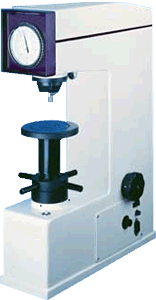Home | Glossary | Resources | Help | Contact Us | Course Map
Archival Notice
This is an archive page that is no longer being updated. It may contain outdated information and links may no longer function as originally intended.
Inspection
After processing oils are removed, the case must be inspected. The physical dimensions are checked against engineering specifications. Some cases may be set aside for grain structure evaluation and/or micro-hardness testing.
This test requires the following:
- Sample cases are sectioned and the cut surfaces polished.
- The polished surface is etched in acid to define the grain boundaries.
- The average grain size is measured, using a microscope with a calibrated eyepiece.
- A hard, sharp point is pressed into the metal with a known amount of force, leaving a tiny, diamond-shaped impression.
- The metallurgist measures micro-hardness using a microscope. The dimensions of the impression are measured; the smaller the impression, the harder the brass.
Some cartridge cases are nickel plated for appearance and/or corrosion resistance. Cosmetic plating is performed after all heat treating is completed and usually accomplished after passing inspection.
Additional Online Courses
- What Every First Responding Officer Should Know About DNA Evidence
- Collecting DNA Evidence at Property Crime Scenes
- DNA – A Prosecutor’s Practice Notebook
- Crime Scene and DNA Basics
- Laboratory Safety Programs
- DNA Amplification
- Population Genetics and Statistics
- Non-STR DNA Markers: SNPs, Y-STRs, LCN and mtDNA
- Firearms Examiner Training
- Forensic DNA Education for Law Enforcement Decisionmakers
- What Every Investigator and Evidence Technician Should Know About DNA Evidence
- Principles of Forensic DNA for Officers of the Court
- Law 101: Legal Guide for the Forensic Expert
- Laboratory Orientation and Testing of Body Fluids and Tissues
- DNA Extraction and Quantitation
- STR Data Analysis and Interpretation
- Communication Skills, Report Writing, and Courtroom Testimony
- Español for Law Enforcement
- Amplified DNA Product Separation for Forensic Analysts


